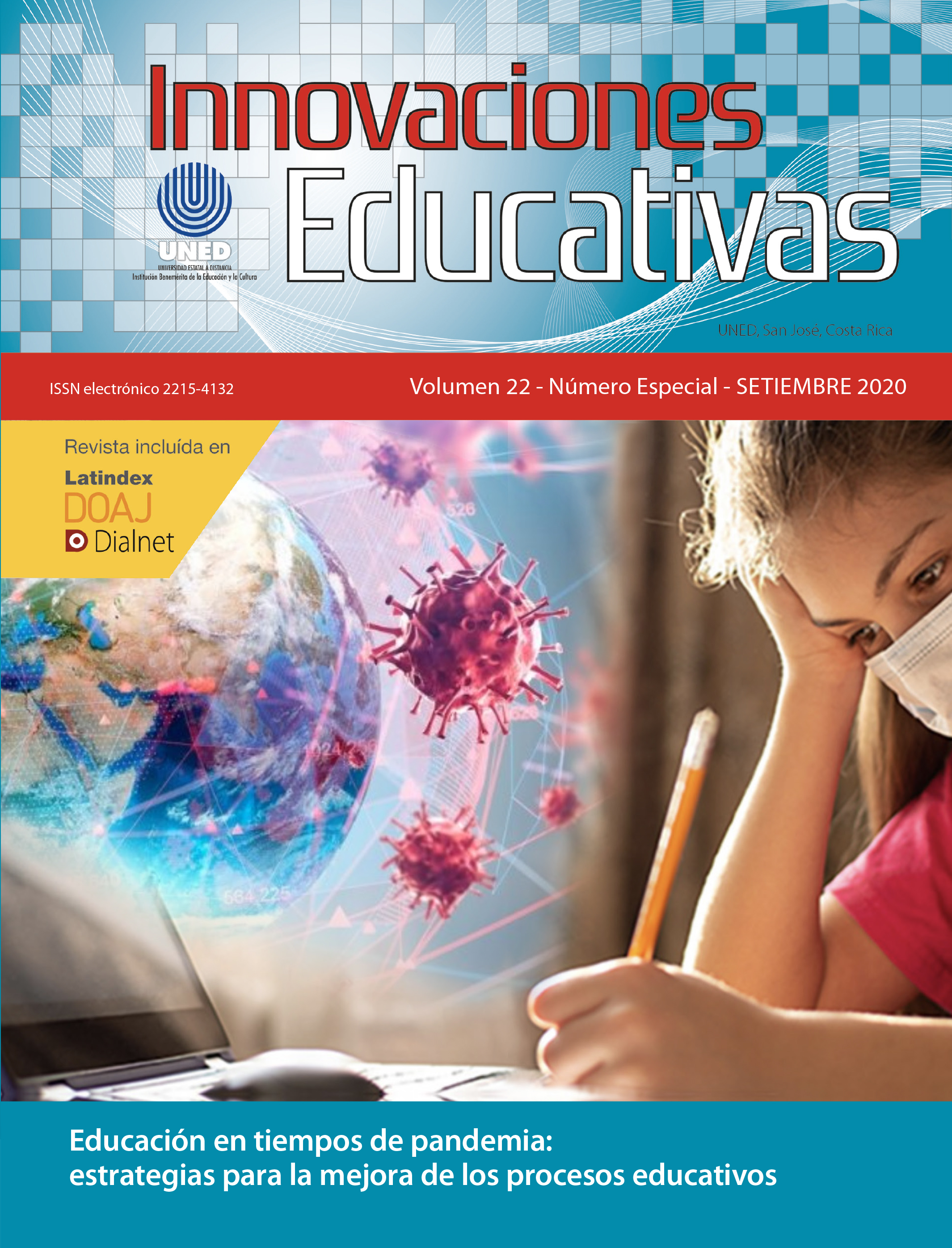Challenges and Opportunities during COVID-19: Pedagogical Context at Universidad Nacional and Universidad Estatal a Distancia
DOI:
https://doi.org/10.22458/ie.v22iEspecial.3154Keywords:
learning environment, teaching competences, technology, educational opportunities, digital gap, COVID-19Abstract
During the pandemic caused by the virus named COVID-19, the educational system experienced a dramatic change from face-to-face to remote learning through the use of technological resources and various platforms to continue with the educational process. This event showed that the pedagogical models that were being implemented did not address the educational needs related to the progress and digital transformation throughout the health crisis. Therefore, this essay aims to reflect on the challenges and opportunities for improvement professors faced due to the pandemic. In fact, this interpretative essay discusses three educational challenges: (1) the contextual change, meaning, the migration from the classrooms to digital platforms and its impact in terms of the communication between instructors and students. (2) The accelerated learning process in the technological field represented a second challenge for the teaching staff as they developed technological abilities, in general terms, for the pedagogical mediation; process which was not frequently done previous to the pandemic. (3) The selection of effective technological tools that were free-access and user-friendly for fostering meaningful learning. This essay concludes with reflective thoughts that reassure teaching practices and the challenges faced during the pandemic as well as opportunities for improvement in relationship with the adaptation, changes, and modernization processes throughout an uncertain and continuously-changing period of time.
References
Didriksson, A., Álvarez, F., Caamaño, C., Caregnato, C., Sfredo, B., Del Valle, D. y Perrota, D. (2020). Educación superior y pandemia: ¿Innovamos, dilatamos el riesgo o perecemos? - reflexiones desde América Latina. Repositorio del Instituto de Investigaciones Sociales, 1-41. Recuperado de https://repositorio.iis.ucr.ac.cr/handle/123456789/598
García-Peñalvo, F. (2020, 12 de mayo). El sistema universitario ante la COVID-19: Corto, medio y largo plazo [Mensaje en un blog]. Recuperado de
https://www.universidadsi.es/sistema-universitario-covid-19/
García-Peñalvo, F., Corell, A., Abella-García, V. y Grande, M. (2020). La evaluación online en la educación superior en tiempos de la COVID-19. Revista eUSAL, 12-26. Recuperado de https://repositorio.grial.eu/bitstream/grial/2010/1/a12.pdf
Hodges, C., Moore, S., Lockee, B., Trust, T. y Bond, A. (2020, 27 de marzo). The difference between emergency remote teaching and online learning [Mensaje en un blog]. Recuperado de https://er.educause.edu/articles/2020/3/the-difference-between-emergency-remote-teaching-and-online-learning
Monasterio, D. y Briseño, M. (abril, 2020). Educación mediada por las tecnologías: Un desafío ante la coyuntura del Covid-19. Observador del Conocimiento, 5(1). Recuperado de http://www.oncti.gob.ve/ojs/index.php/rev_ODC/article/view/31/23
Pérez, M. (octubre, 2009). La comunicación y la interacción en contextos virtuales de aprendizaje. Apertura, 1(1). Recuperado de http://www.udgvirtual.udg.mx/apertura/index.php/apertura/article/view/15/18
Prendes, M., & Gutiérrez, I. (agosto, 2013). Competencias tecnológicas del profesorado en las universidades españolas. Revista de Educación, (361). Recuperado de https://www.educacionyfp.gob.es/dctm/revista-de-educacion/articulosre361/re36108.pdf?documentId=0901e72b8162f031
Ramírez, K. (2020, 26 de mayo). UNED aprueba medidas de apoyo económico para estudiantes afectados por el COVID-19. Acontecer. Recuperado de https://www.uned.ac.cr/acontecer/a-diario/gestion-universitaria/4064-uned-aprueba-medidas-de-apoyo-economico-para-estudiantes-afectados-por-el-covid-19
Sandí, J., & Sanz, C. (2018). Revisión y análisis sobre competencias tecnológicas esperadas en el profesorado en Iberoamérica. Edutec Revista Electrónica de Tecnología Educativa, (66), 93-121. https://doi.org/10.21556/edutec.2018.66.1225
Tijo, S. (2020). Enseñanza remota de emergencia en ingeniería civil: Lecciones aprendidas. Encuentro Internacional de Educación en Ingeniería, 1-10. Recuperado de https://www.acofipapers.org/index.php/eiei/article/view/781
UNESCO. (2020). 290 millones de estudiantes sin clases por el COVID-19: La UNESCO divulga las primeras cifras mundiales y se moviliza para dar respuesta a la crisis. Recuperado de https://es.unesco.org/news/290-millones-estudiantes-clases-covid-19-unesco-divulga-primeras-cifras-mundiales-y-se-moviliza
UNESCO-IESALC. (2020). El Coronavirus Covid-19 y la educación superior: Impacto y recomendaciones. Recuperado de https://www.iesalc.unesco.org/2020/04/02/el-coronavirus-covid-19-y-la-educacion-superior-impacto-y-recomendaciones/

